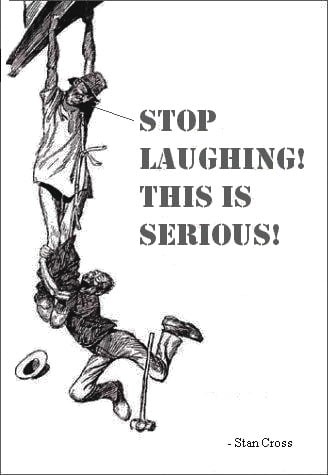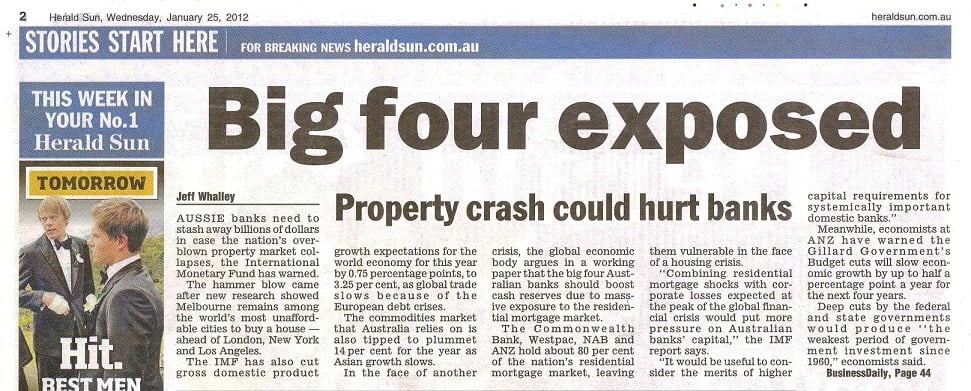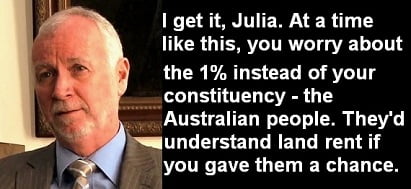What’s the logical extension of the Austrian/libertarian thesis?
It is that the super-wealthy should be left alone to accumulate more and more of the people’s economic rent.
Remember economic rent? That’s the imputed rent of land and natural resources which, created by the community, and being the one thing owed equally to everyone, ought to be the natural source of revenue.
But there are no such “oughts” with the Austrian/libertarian mindset – only that those who steal our rents ought to be left alone. This is private enterprise in full flower for the Royal Libertarian.
A problem with Austrians/libertarians is that the only alternative hegemony they are able to see is socialism.
They are blind to Georgism which offers a third alternative: free and fair enterprise. It will never result in bloody revolutions, because the 0.01% rentier class can’t get to control so much of a nation’s wealth that its people become debt-ridden and impoverished (as now).
I like the Daily Reckoning for its irreverence for the status quo. They’re as one with Georgists on that one.
They’re quite right about the damage taxation has wrought upon world economies, but they fail to see economic rent is NOT a tax.
I invite you to read between the lines on Bill Bonner’s piece in the Daily Reckoning today to see if you can spot the catch in his philosophy I’ve mentioned:-
Obama’s Fairness Doctrine
By Bill Bonner
“The US is going to hell,” we told the group at the Watergate last night.
“You mean the economy is really going to get worse, huh?”
“No, I mean it’s going to hell.”
We had been invited to watch the State of the Union address with a group of dinosaurs…a group approaching extinction with dignity and intelligence. You might call them ‘thinking conservatives,’ ‘paleo- conservatives’ or ‘constitutionalists.’ Whatever they were, they were not like the scoundrels currently running for the Republican nomination or the yahoos who vote for them. They were more like a renegade, retrograde group…like a secret society of White Russian intellectuals after the Revolution of 1917. They cling to hope…that the nation will come to its senses…that the constitution will again be honoured…and that the old republic, established by the founding fathers, will be resurrected…
..they will hang on to their hope…until they are hanged by a rope.
“What do you mean?”
“I mean…it is on the road to hell… This isn’t just about losing money. Heck, the US is going broke. But you can go broke with honour. Good people go broke. Smart people go broke. Dumb people go broke. You can’t go to hell with honour. Bad people go to hell.”
“You’re saying the American people are bad?”
“Not by nature. No people are bad by nature. Even Republicans are not bad by nature. Or good. They’re all subject to influence. And now Americans are under a bad spell…being influenced to do terrible things…”
We turned to the TV. There was the commander-in-chief. The gist of his message was that the economy was getting better…thanks to all the feds’ nifty programs and fixes. He spoke of all the wonderful things he and his group of fixers had done.
But he didn’t seem content with what he has achieved. Something vexed the chief executive. It was not the economy. Nor the constitution. Nor the foreign wars.
What stuck in POTUS’s craw was ‘fairness.’ He didn’t seem to think there was enough of it. And he felt it was his job, or part of it, to determine what was fair…and how to make sure it happens.
In his wisdom, he has determined that it isn’t fair for a rich person to pay less than 30% of his income to…well…to the feds.
Here’s the Bloomberg report:
President Barack Obama, offering an election-year prescription to spur the economy, said the wealthiest Americans should pay more taxes in the name of fairness, to bring down the deficit and ensure those trying to make ends meet don’t have to “make up the difference.”
In his State of the Union address last night, Obama called on Congress to embrace a tax plan named for billionaire Warren Buffett that would require those making $1 million or more pay at least 30 percent in taxes. With congressional gridlock heightened by the 2012 election, there is little chance the proposal will pass.
“You can call this class warfare all you want,” Obama said in a nationally televised speech before a joint session of Congress. “But asking a billionaire to pay at least as much as his secretary in taxes? Most Americans would call that common sense.”
The president’s 65-minute address was directed at both voters and Congress. The populist themes – tax fairness, help for homeowners, cracking down on US financial crimes and unfair trade practices in China and investigating the lending practices that preceded the housing crisis – are those he will be repeating as he campaigns for a second term.
On the same day that Barack Obama revealed that 30% was fair, Mitt Romney revealed that he paid less than 14% of his income in US federal taxes.
Fourteen percent of income seems like more than enough to us. Serfs in the Dark Ages paid less. But it’s not enough to satisfy our main man, Barry Obama. He wants more. And all the low-life zombies who decide elections want more too. ‘The rich’ should pay more, they say.
Even a lot of the world’s rich people think so. Also in the news was a report telling us that a group of very nice billionaires has gotten together at a very chilly place and suggested that they should all pay more in taxes.
Ukrainian billionaire Victor Pinchuk wants to talk about income inequality. So does Irish billionaire Denis O’Brien and Indian billionaire Vikas Oberoi.
The three are among a contingent of at least 70 billionaires who are joining more than 2,500 business and political leaders at the World Economic Forum’s annual meeting in Davos, Switzerland, this week, according to a list of attendees and promotional materials obtained by Bloomberg News. A half-dozen of the richest participants, interviewed in advance of the conference, say economic disparity needs to be addressed.
Some sessions in a series labelled “Ensuring Inclusive Growth and Development” will touch on income inequality, said Kevin Steinberg, chief operating officer of the forum in the US. A panel titled “Remodelling Capitalism” is scheduled for Jan. 27 at the Swiss Alpine High School auditorium, six shuttle- bus stops away from the conference’s main location.
See there. A group of people in Davos is going to figure out how to ‘remodel capitalism.’ Out with the dowdy old rattan furniture. Throw out the chintz. Let’s get contemporary!
Already, there’s a problem. If you think you can remodel capitalism you are hopelessly already lost. You must presume someone modelled it in the first place. Who? When? How?
Fact is, capitalism is what you get when you don’t have master designers on the job. It’s what happens when POTUS and the feds leave it alone. It’s what you get when people are allowed to work out their own designs, one by one, willingly… without a gun to their heads… When they can make money or go broke themselves…and Washington doesn’t care.
But that’s the trouble with Davos. They’re all meddlers. They’re all world improvers. And they’re all making the world a worse place.
And more thoughts…
“If James Madison and the rest of the people who were at the constitutional convention came back to the US they wouldn’t recognise it,” said a man we met last night at the Watergate.
“They’d be appalled. They put all that work into the US Constitution…using every trick they could think of to limit the power of the executive branch. Because they knew that if you let the executive branch get away with it, it’s only a matter of time before it becomes a tyrant. It doesn’t matter whether you call it a king or a dictator…or an emperor…once you put too much power in one man’s hands, you will corrupt the man who has the power…and destroy the society that gave it to him.
“That was the whole point of the constitution. It was to limit power. They put in checks and balances…and the Bill of Rights. They thought about it. They figured it out. They wanted to be sure that the US really was different. The people were meant to be sovereign. They were meant to be in control.
“And the role of the government…and the only role of the government…was to protect the liberty and sovereignty of the people. And they knew too that the main threat to individual liberty was the government. That’s why you needed warrants…you need to have a trial by a jury of your peers…you needed habeus corpus. They built all these protections into the system to protect the individual from the government. They weren’t there to protect the individual from Al Qaida or from China. They were there to protect the individual citizen from the government.
“And now, with this anti-terrorism bugaboo all of those protections have gone away. The president has the power to put any American citizen in jail – for life. No charges. No witnesses. No hearing. No trial. No nothing.
“He can have you tortured. He can have you killed.
“I mean, President Obama has powers that King George would have envied. And he got those outrageous powers without a word of protest. Nobody said anything. Congress said nothing. The people said nothing.
“Yeah…I guess that’s what you mean about Americans going to hell. I guess they deserve to go to hell. But, of course, that’s exactly what we’re trying to stop…
“And now the prez has more power than Louis the 14th… And he was supposed to be an absolute monarch I mean, Louis had to pay for his wars. He had to pay for his public buildings. He had the nobility against him much of the time. He had much of Europe against him.
“America was lucky. It was far from Europe. It was protected by oceans from foreign domination. Every backwoodsman had a rifle and he knew how to use it. You know that when King George sent troops to put down the revolution a letter appeared in the London paper. It came from a man who had lived in the colonies. He told his countrymen that if they were shipping out to fight the Americans they should be sure to write their Last Wills and Testaments before they left. Because the Americans all had guns and knew how to use them.
“And that is also why the new government of the US went to such lengths to try to curb the power of the army. There was to be no standing army. The whole idea was a nation of free men. Armed and ready to protect themselves. And the constitution was very clear, if the president wanted to make war he had to convince congress not only to approve it…it also had to raise an army and raise the money to pay for it.
“But now the president can make war on whomever he pleases with no act of Congress. He doesn’t even have to ask the congress for money. There’s so much money sloshing around in the Homeland Security and Pentagon budgets that he can make war on anyone.
“The apologists for this kind of thing say the president will only use his new powers for good causes. But that’s not what history tells us. Even if one or two presidents resist…and govern more or less benevolently, like Caesar Augustus…it won’t be long before we get a Caligula, a Nero, or a Gingrich…
“So now we send out drones and hit squads to kill people in Afghanistan and Pakistan. And soon – it is just a matter of time before the power corrupts the US president, if it hasn’t already – that the drones and hit squads target Americans on American soil.”
“Yeah…you.”
Regards,
Bill Bonner
for The Daily Reckoning Australia










